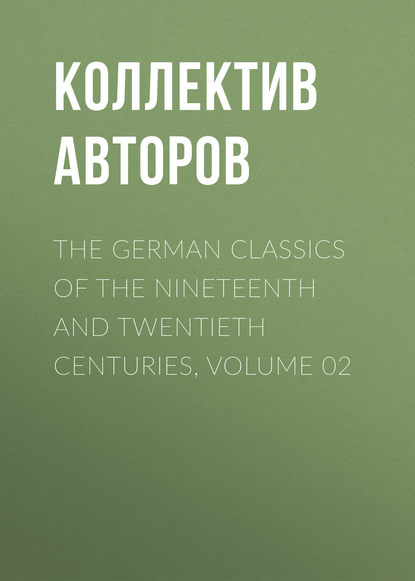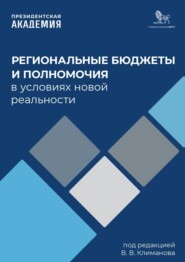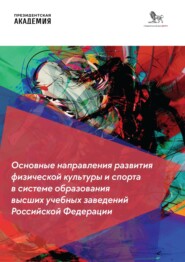По всем вопросам обращайтесь на: info@litportal.ru
(©) 2003-2024.
✖
The German Classics of the Nineteenth and Twentieth Centuries, Volume 02
Настройки чтения
Размер шрифта
Высота строк
Поля
"I shall be very glad indeed," replied the Captain, to whom Charlotte had addressed herself. "That is, I will tell you as well as I can. My ideas on the subject date ten years back; whether the scientific world continues to think the same about it, I cannot tell."
"It is most disagreeable," cried Edward, "that one cannot now-a-days learn a thing once for all, and have done with it. Our forefathers could keep to what they were taught when they were young; but we have, every five years, to make revolutions with them, if we do not wish to drop altogether out of fashion."
"We women need not be so particular," said Charlotte; "and, to speak the truth, I only want to know the meaning of the word. There is nothing more ridiculous in society than to misuse a strange technical word; and I only wish you to tell me in what sense the expression is made use of in connection with these things. What its scientific application is I am quite contented to leave to the learned; who, by-the-by, as far as I have been able to observe, do not find it easy to agree among themselves."
"Whereabouts shall we begin," said Edward, after a pause, to the Captain, "to come most quickly to the point?"
The latter, after thinking as little while, replied shortly:
"You must let me make what will seem a wide sweep; we shall be on our subject almost immediately."
Charlotte settled her work at her side, promising the fullest attention.
The Captain began:
"In all natural objects with which we are acquainted, we observe immediately that they have a certain relation to themselves. It may sound ridiculous to be asserting what is obvious to every one; but it is only by coming to a clear understanding together about what we know, that we can advance to what we do not know."
"I think," interrupted Edward, "we can make the thing more clear to her, and to ourselves, with examples; conceive water, or oil, or quicksilver; among these you will see a certain oneness, a certain connection of their parts; and this oneness is never lost, except through force or some other determining cause. Let the cause cease to operate, and at once the parts unite again."
"Unquestionably," said Charlotte, "that is plain; rain-drops readily unite and form streams; and when we were children, it was our delight to play with quicksilver, and wonder at the little globules splitting and parting and running into one another."
"And here," said the Captain, "let me just cursorily mention one remarkable thing—I mean, that the full, complete correlation of parts which the fluid state makes possible, shows itself distinctly and universally in the globular form. The falling water-drop is round; you yourself spoke of the globules of quicksilver; and a drop of melted lead let fall, if it has time to harden before it reaches the ground, is found at the bottom in the shape of a ball."
"Let me try and see," said Charlotte, "whether I can understand where you are bringing me. As everything has a reference to itself, so it must have some relation to others."
"And that," interrupted Edward, "will be different according to the natural differences of the things themselves. Sometimes they will meet like friends and old acquaintances; they will come rapidly together, and unite without either having to alter itself at all—as wine mixes with water. Others, again, will remain as strangers side by side, and no amount of mechanical mixing or forcing will succeed in combining them. Oil and water may be shaken up together, and the next moment they are separate again, each by itself."
"One can almost fancy," said Charlotte, "that in these simple forms one sees people that one is acquainted with; one has met with just such things in the societies amongst which one has lived; and the strangest likenesses of all with these soulless creatures are in the masses in which men stand divided one against the other, in their classes and professions; the nobility and the third estate, for instance, or soldiers and civilians."
"Then again," replied Edward, "as these are united under common laws and customs, so there are intermediate members in our chemical world which will combine elements that are mutually repulsive."
"Oil, for instance," said the Captain, "we make combine with water with the help of alkalis–"
"Do not go on too fast with your lesson," said Charlotte. "Let me see that I keep step with you. Are we not here arrived among the affinities?"
"Exactly," replied the Captain; "we are on the point of apprehending them in all their power and distinctness; such natures as, when they come in contact, at once lay hold of each other, each mutually affecting the other, we speak of as having an affinity one for the other. With the alkalis and acids, for instance, the affinities are strikingly marked. They are of opposite natures; very likely their being of opposite natures is the secret of their inter-relational effect—each reaches out eagerly for its companion, they lay hold of each other, modify each other's character, and form in connection an entirely new substance. There is lime, you remember, which shows the strongest inclination for all sorts of acids—a distinct desire of combining with them. As soon as our chemical chest arrives, we can show you a number of entertaining experiments which will give you a clearer idea than words, and names, and technical expressions."
"It appears to me," said Charlotte, "that, if you choose to call these strange creatures of yours related, the relationship is not so much a relationship of blood as of soul or of spirit. It is the way in which we see all really deep friendship arise among men, opposite peculiarities of disposition being what best makes internal union possible. But I will wait to see what you can really show me of these mysterious proceedings; and for the present," she added, turning to Edward, "I will promise not to disturb you any more in your reading. You have taught me enough of what it is about to enable me to attend to it."
"No, no," replied Edward, "now that you have once stirred the thing, you shall not get off so easily. It is just the most complicated cases which are the most interesting. In these you come first to see the degrees of the affinities, to watch them as their power of attraction is weaker or stronger, nearer or more remote. Affinities begin really to interest only when they bring about separations."
"What!" cried Charlotte, "is that miserable word, which unhappily we hear so often now-a-days in the world; is that to be found in nature's lessons too?"
"Most certainly," answered Edward; "the title with which chemists were supposed to be most honorably distinguished was, artists of separation."
"It is not so any more," replied Charlotte; "and it is well that it is not. It is a higher art, and it is a higher merit, to unite. An artist of union is what we should welcome in every province of the universe. However, as we are on the subject again, give me an instance or two of what you mean."
"We had better keep," said the Captain, "to the same instances of which we have already been speaking. Thus, what we call limestone is a more or less pure calcareous earth in combination with a delicate acid, which is familiar to us in the form of a gas. Now, if we place a piece of this stone in diluted sulphuric acid, this will take possession of the lime, and appear with it in the form of gypsum, the gaseous acid at the same time going off in vapor. Here is a case of separation; a combination arises, and we believe ourselves now justified in applying to it the words 'Elective Affinity;' it really looks as if one relation had been deliberately chosen in preference to another.
"Forgive me," said Charlotte, "as I forgive the natural philosopher. I cannot see any choice in this; I see a natural necessity rather, and scarcely that. After all, it is perhaps merely a case of opportunity. Opportunity makes relations as it makes thieves; and as long as the talk is only of natural substances, the choice to me appears to be altogether in the hands of the chemist who brings the creatures together. Once, however, let them be brought together, and then God have mercy on them. In the present case, I cannot help being sorry for the poor acid gas, which is driven out up and down infinity again."
"The acid's business," answered the Captain, "is now to get connected with water, and so serve as a mineral fountain for the refreshing of sound or disordered mankind."
"That is very well for the gypsum to say," said Charlotte. "The gypsum is all right, is a body, is provided for. The other poor, desolate creature may have trouble enough to go through before it can find a second home for itself."
"I am much mistaken," said Edward, smiling, "if there be not some little arrière pensée behind this. Confess your wickedness! You mean me by your lime; the lime is laid hold of by the Captain, in the form of sulphuric acid, torn away from your agreeable society, and metamorphosed into a refractory gypsum."
"If your conscience prompts you to make such a reflection," replied Charlotte, "I certainly need not distress myself. These comparisons are pleasant and entertaining; and who is there that does not like playing with analogies? But man is raised very many steps above these elements; and if he has been somewhat liberal with such fine words as Election and Elective Affinities, he will do well to turn back again into himself, and take the opportunity of considering carefully the value and meaning of such expressions. Unhappily, we know cases enough where a connection apparently indissoluble between two persons, has, by the accidental introduction of a third, been utterly destroyed, and one or the other of the once happily united pair been driven out into the wilderness."
"Then you see how much more gallant the chemists are," said Edward.
"They at once add a fourth, that neither may go away empty."
"Quite so," replied the Captain. "And those are the cases which are really most important and remarkable—cases where this attraction, this affinity, this separating and combining, can be exhibited, the two pairs severally crossing each other; where four creatures, connected previously, as two and two, are brought into contact, and at once forsake their first combination to form into a second. In this forsaking and embracing, this seeking and flying, we believe that we are indeed observing the effects of some higher determination; we attribute a sort of will and choice to such creatures, and feel really justified in using technical words, and speaking of 'Elective Affinities.'"
"Give me an instance of this," said Charlotte.
"One should not spoil such things with words," replied the Captain. "As I said before, as soon as I can show you the experiment, I can make it all intelligible and pleasant for you. For the present, I can give you nothing but horrible scientific expressions, which at the same time will give you no idea about the matter. You ought yourself to see these creatures, which seem so dead, and which are yet so full of inward energy and force, at work before your eyes. You should observe them with a real personal interest. Now they seek each other out, attract each other, seize, crush, devour, destroy each other, and then suddenly reappear again out of their combinations, and come forward in fresh, renovated, unexpected form; thus you will comprehend how we attribute to them a sort of immortality—how we speak of them as having sense and understanding; because we feel our own senses to be insufficient to observe them adequately, and our reason too weak to follow them."
"I quite agree," said Edward, "that the strange scientific nomenclature, to persons who have not been reconciled to it by a direct acquaintance with or understanding of its object, must seem unpleasant, even ridiculous; but we can easily, just for once, contrive with symbols to illustrate what we are speaking of."
"If you do not think it looks pedantic," answered the Captain, "I can put my meaning together with letters. Suppose an A connected so closely with a B, that all sorts of means, even violence, have been made use of to separate them, without effect. Then suppose a C in exactly the same position with respect to D. Bring the two pairs into contact; A will fling himself on D, C on B, without its being possible to say which had first left its first connection, or made the first move toward the second."
"Now then," interposed Edward, "till we see all this with our eyes, we will look upon the formula as an analogy, out of which we can devise a lesson for immediate use. You stand for A, Charlotte, and I am your B; really and truly I cling to you, I depend on you, and follow you, just as B does with A. C is obviously the Captain, who at present is in some degree withdrawing me from you. So now it is only just that if you are not to be left to solitude a D should be found for you, and that is unquestionably the amiable little lady, Ottilie. You will not hesitate any longer to send and fetch her."
"Good," replied Charlotte; "although the example does not, in my opinion, exactly fit our case. However, we have been fortunate, at any rate, in today for once having met all together; and these natural or elective affinities have served to unite us more intimately. I will tell you, that since this afternoon I have made up my mind to send for Ottilie. My faithful housekeeper, on whom I have hitherto depended for everything, is going to leave me shortly, to be married. (It was done at my own suggestion, I believe, to please me.) What it is which has decided me about Ottilie, you shall read to me. I will not look over the pages again. Indeed, the contents of them are already known to me. Only read, read!"
With these words, she produced a letter, and handed it to Edward.
CHAPTER V
LETTER OF THE LADY SUPERIOR
"Your ladyship will forgive the brevity of my present letter. The public examinations are but just concluded, and I have to communicate to all the parents and guardians the progress which our pupils have made during the past year. To you I may well be brief, having to say much in few words. Your ladyship's daughter has proved herself first in every sense of the word. The testimonials which I inclose, and her own letter, in which she will detail to you the prizes which she has won, and the happiness which she feels in her success, will surely please, and I hope delight you. For myself, it is the less necessary that I should say much, because I see that there will soon be no more occasion to keep with us a young lady so far advanced. I send my respects to your ladyship, and in a short time I shall take the liberty of offering you my opinion as to what in future may be of most advantage to her.
"My good assistant will tell you about Ottilie."
LETTER OF THE ASSISTANT
"Our reverend superior leaves it to me to write to you of Ottilie, partly because, with her ways of thinking about it, it would be painful to her to say what has to be said; partly, because she herself requires some excusing, which she would rather have done for her by me.
"Knowing, as I did too well, how little able the good Ottilie was to show out what lies in her, and what she is capable of, I was all along afraid of this public examination. I was the more uneasy, as it was to be of a kind which does not admit of any especial preparation; and even if it had been conducted as usual, Ottilie never can be prepared to make a display. The result has only too entirely justified my anxiety. She has gained no prize; she is not even amongst those whose names have been mentioned with approbation. I need not go into details. In writing, the letters of the other girls were not so well formed, but their strokes were far more free. In arithmetic, they were all quicker than she; and in the more difficult problems, which she does the best, there was no examination. In French, she was outshone and out-talked by many; and in history she was not ready with her names and dates. In geography, there was a want of attention to the political divisions; and for what she could do in music there was neither time nor quiet enough for her few modest melodies to gain attention. In drawing she certainly would have gained the prize; her outlines were clear, and the execution most careful and full of spirit; unhappily, she had chosen too large a subject, and it was incomplete.
"After the pupils were dismissed, the examiners consulted together, and we teachers were partially admitted into the council. I very soon observed that of Ottilie either nothing would be said at all, or if her name was mentioned, it would be with indifference, if not absolute disapproval. I hoped to obtain some favor for her by a candid description of what she was, and I ventured it with the greater earnestness, partly because I was only speaking my real convictions, and partly because I remembered in my own younger years finding myself in the same unfortunate case. I was listened to with attention, but as soon as I had ended, the presiding examiner said to me very kindly but laconically, 'We presume capabilities: they are to be converted into accomplishments. This is the aim of all education. It is what is distinctly intended by all who have the care of children, and silently and indistinctly by the children themselves. This also is the object of examinations, where teachers and pupils are alike standing their trial. From what we learn of you, we may entertain good hopes of the young lady, and it is to your own credit also that you have paid so much attention to your pupil's capabilities. If in the coming year you can develop these into accomplishments, neither yourself nor your pupil shall fail to receive your due praise.'
"I had made up my mind to what must follow upon all this; but there was something worse that I had not anticipated, which had soon to be added to it. Our good Superior, who like a trusty shepherdess could not bear to have one of her flock lost, or, as was the case here, to see it undistinguished, after the examiners were gone could not contain her displeasure, and said to Ottilie, who was standing quite quietly by the window, while the others were exulting over their prizes: 'Tell me, for heaven's sake, how can a person look so stupid if she is not so?' Ottilie replied, quite calmly, 'Forgive me, my dear mother, I have my headache again today, and it is very painful.' Kind and sympathizing as she generally is, the Superior this time answered, 'No one can believe that,' and turned angrily away.
"Now it is true—no one can believe it—for Ottilie never alters the expression of her countenance. I have never even seen her move her hand to her head when she has been asleep.

















